Most women who have been harassed haven’t reported it
The growing list of men so far who have been accused of sexual misconduct may grow even more. Half of all women in the latest Economist/YouGov poll say they have personally experienced sexual harassment – but just one in three have reported any such incident. Nearly three in four women say there was at least one instance of harassment they did not report.
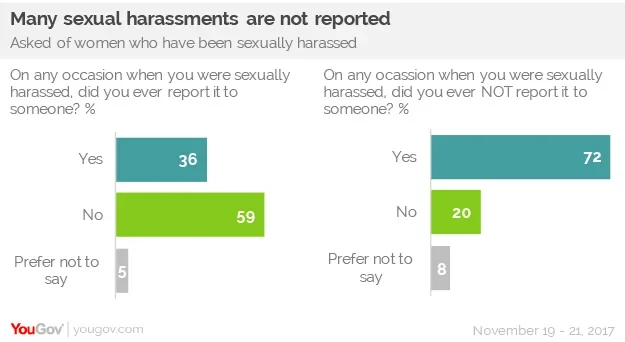
Most Americans believe women’s accusations – at least the accusations made against prominent political figures, and as they did last week when asked about Hollywood’s accused abusers, say there should be punishment. Few grant leniency now, even when the abuse accusations are made retrospectively. But unlike the Hollywood charges, accusations about political figures are also seen and judged through a political screen. After all, by more than three to one (65% to 18%,), the public sees sexual harassment as more about power than about sex.
For many, the situation hasn’t improved. The public is as likely to believe sexual harassment is a bigger problem today as to say it was worse 20 years ago. Women don’t see the situation improving, while men think things are better today.
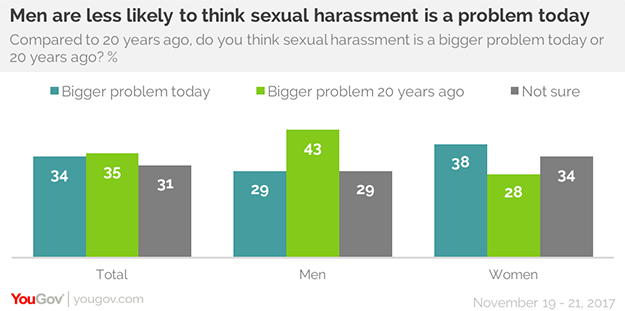
When judging the wide range of recent (and some past) accusations against political figures, Americans generally profess belief in the allegations. Majorities or pluralities believe that: Alabama Senate candidate Roy Moore had improper sexual contact with high school students in the past (54% say that is definitely or probably true, 14% definitely or probably not true); President Donald Trump made unwanted sexual advances to women over many years (75% to 16%); former President Bill Clinton committed sexual assault (74% to 9%); Democratic Senator Al Franken (62% to 8%) and Supreme Court Justice Clarence Thomas (45% to 21%) engaged in sexual harassment; and that former President George H.W. groped women (47% to 23%).
In all cases, there is either little difference in the answers of men and women, or men are more likely than women to express a conviction that the men are guilty.
There are times when partisans back away from accusing men in their own party of sexual abuses. 68% of Democrats think Bill Clinton is likely guilty, but most say that is “probably” the case, and not “definitely” true. Republicans are more likely to believe the accusations against Trump than to disbelieve them, but also choose the “probably” option.
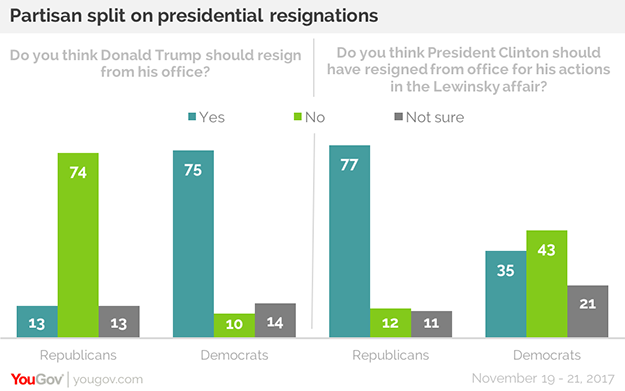
Those who voted for Donald Trump last year narrowly think the accusations against him are true.
The recent focus on sexual harassment allegations clearly have damaged Americans’ current image of former President Clinton. By two to one (53% to 27%), Americans now say that President Clinton should have resigned during the Monica Lewinsky affair. On Election Day 1998, the year of Clinton’s impeachment, voters said the opposite. In the network exit poll that year, only 42% said Clinton should resign, while 59% said he should remain in office. Today, more than a third of Democrats think Clinton should have resigned, while just 43% of Democrats disagree.
As for the accusations against Roy Moore, Republicans are also taking a step back, despite Moore’s denials. One in three Republicans believe the accusations, while nearly a quarter do not. But the largest number of Republicans do not even venture an opinion on whether or not Moore had improper sexual contact with high school students.
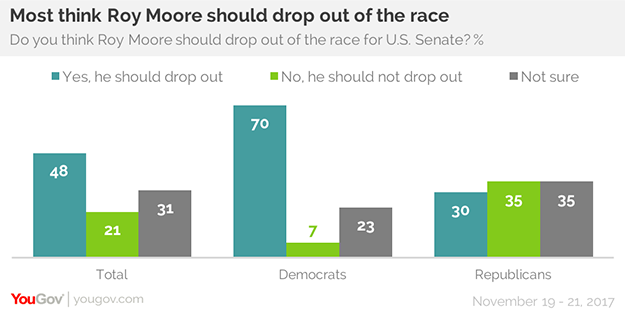
There is little tolerance for adult men having relationships with high school women. Only 6% believe it is appropriate for a man in his 30s to date women in high school.
70% of Democrats say Moore should drop out of the Senate race. But so do 30% of Republicans – nearly as many as the 35% who believe he should refuse to leave the race. Nearly half of Republicans in the poll say they would vote for Moore if they were registered in Alabama, but nearly a quarter of Republicans say they would write in someone else.
When it comes to their political figures and inappropriate sexual behavior, Americans have no statute of limitations, though some punishments might depend on the severity of the offense. A third would remove a member of Congress who engaged in sexual misconduct before serving in Congress, though more say it depends on how severe the misconduct was. If it happened while someone was serving in Congress, two out of three would remove that Congressman.
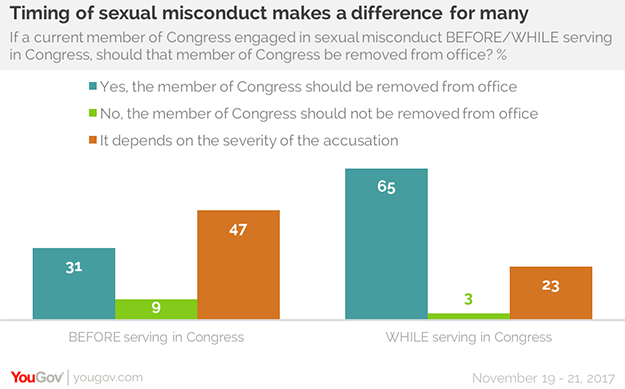
Republicans and Democrats generally agree on this; so do women and men.
Image: Getty








